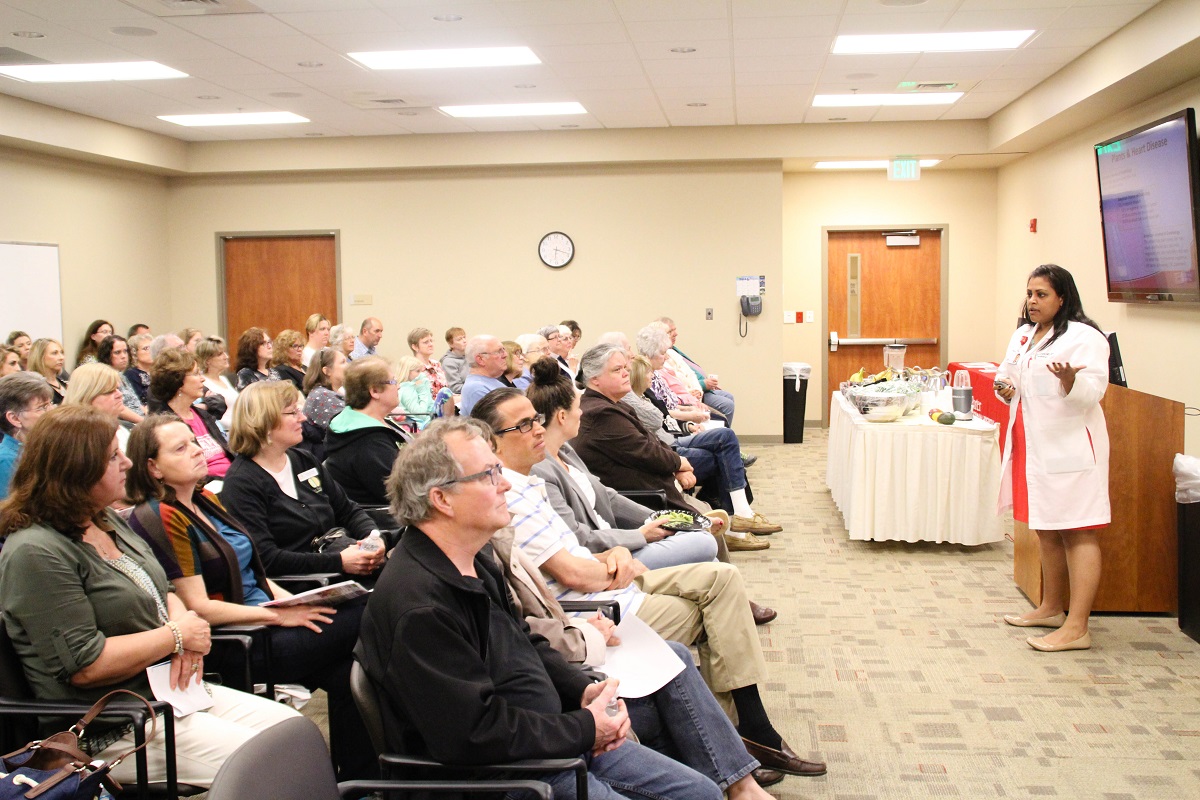Porter Health Care System is mindful of the health and well-being of anyone who walks through its doors. Preventative medicine is something that Porter and many of the resident physicians practice, as they know that it’s the steps we take now for our health that determine what our health will be like later in life.
Dr. Maya Kommineni, a cardiologist at Porter, hosted a special event in mid-May titled: The Green Facts: Achieving Your Best Health Possible. The event was free and open to the public, and citizens from all over the region packed into a welcoming conference room at Porter Regional Hospital to take in Dr. Kommineni’s presentation.
Dr. Kommineni specializes in noninvasive cardiology. She works with men and women who are interested in preventative healthcare as well as individuals who have already been diagnosed with cardiovascular disease. She has traveled the world and in her time abroad, come across some fantastic food finds. In her presentation she talked about some of the world’s healthiest superfoods, their health benefits, and what we can do to take advantage of their nutritious properties.
“I think it’s really important to talk about new foods, ingredients, and spices that people don’t quite know about yet in the U.S. and let them know about their health benefits,” Dr. Kommineni said. “I can show them ways to combine these foods to get the best results for their health. Preventative medicine is so important because it can keep people from getting diseases and disorders that once gotten, can’t be reversed.”
Kale was the first item on Dr. Kommineni’s list. Once considered a weed in ancient Greece, kale is now considered a superfood. One cup of kale contains 206% of the daily recommended allowance of Vitamin A, 684% of the daily recommended allowance of Vitamin K, 134% of the daily recommended allowance of Vitamin C, as well as good amounts of manganese, calcium, copper, potassium, and Vitamin B6.
Kale is known to:
- Lower blood pressure
- Promote strong and healthy bones
- It lowers sugar levels in the body, making the cells very sensitive to insulin, which helps the prevent the onset of diabetes.
- Helps prevent cancer by providing lots of beta-carotenes (Vitamin A) and binding chlorophyll (found in many dark, leafy greens) with heterocyclic amines (carcinogens) which prevents the body from absorbing them.
Ginger was next on Dr. Kommineni’s list. This spicy root vegetable dates back thousands of years and it has many, many medicinal properties that people from all over the world have been utilizing. Dr. Kommineni reminded attendees that this isn’t something one should eat if he or she is on blood thinners as ginger acts as a natural blood thinner.
Ginger is known to:
- Be antiemetic
- Be antiseptic
- Be anti-inflammatory
- Be anti-thrombotic
- Prevent motion sickness
- Lower cholesterol – decrease TG and LDL-c and increase HDL
- Improve blood circulation
- Reduce hypertension
Turmeric was the next item that Dr. Kommineni touched on. This tuberous root is native to India and has a long history of being used for medicinal purposes. The active ingredient in turmeric, curcumin, is what gives it its famous yellow color. The benefits that one can get from turmeric are centered around the G.I. tract.
Turmeric is known to:
- Ease stomach pain
- Be anti-inflammatory
- Be anti-thrombotic
- Be antibacterial
- Increase bile secretion
- Decrease the risk of skin, stomach, and liver diseases
- Decrease the risk of developing cancer
- Lower cholesterol
Saving her favorite for last, Dr. Kommineni finally spoke on avocado. This fruit is low in sugar, high in monounsaturated fatty acids, and every part of the avocado can be used from the leaves to the bark of the tree to the oil, etc. Avocados are filled with Vitamins B1, 2, 3, 5, 6, and 9; Vitamin C, E, and K; as well as calcium, manganese, and many other nutrients. They have anti-inflammatory properties, carotenoids (which help our bodies absorb lycopene and beta-carotene), and glutathione. Glutathione is probably something that is new to many who hear the word. Our bodies produce it as a way to protect our DNA from being damaged, which can lead to cancer.
“This was a very interesting and informative presentation,” Sandra Schaffer said. “Dr. Kommineni really knows what she’s talking about and it’s great that Porter offers events like these to the community for free.”
"Heart disease runs in my family," Rebecca Marlow, an attendee who also works with Dr. Kommineni as a Scheduler at Northwest Indiana Cardiology Physician Group said. "Preventative medicine has always interested me and Dr. Kommineni is very intelligent and she presented things in a way that everyone could understand."
At the end of the presentation, Dr. Kommineni demonstrated how to make a smoothie using all of the aforementioned ingredients as well as other fruits and vegetables. The recipe was created by Dr. Kommineni and she drinks these smoothies every morning. There were other dishes available at the presentation that patrons could partake in that also contained the superfoods. This allowed everyone to not only hear about the benefits, but taste them as well.


